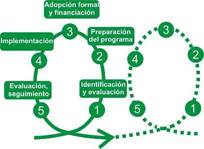-Integrated
Coastal Area Management.
Integrated
Coastal Area Management. ICAM, according
to one of the most generally accepted
definitions, is (a) a continuous process
to reach coastal sustainability, (b) a
process that should start from scientific
discoveries from recent years, and (c)
a process demanding close collaboration
between distinct parties and public and
private institutions with responsibility
and interest in the coast.
Understanding
the effects of global change and the complexity
of the coastal zone require a solid base
in research. Science should play an important
role in developing new forms of coastal
management that based on viable information.
Integrated
Coastal Zone Management (ICZM) is a dynamic,
multidisciplinary process that supports
sustainable development in the coastal
zone, defi ned as “development that
meets the needs of the present without
compromising the ability of future generations
to meet their own needs”(Brundtland
Report 1987)

ICZM seeks to develop a new model for
development that is based on fi nding
points of equilibrium among governance,
economic needs, quality of life and preservation
of natural resources. If properly implemented,
it is the most effective tool to advance
towards sustainability in the coastal
zone, ensuring equitable use of coastal
resources (natural, socioeconomic, and
cultural) and integration among the different
administrative sectors and sectors of
society.
- The
challenge: Sustainability and ICAM in
the Balearic Islands.
The challenge:
Sustainability and ICAM in the Balearic
Islands. The Balearic coast (both land
and water) is the main resource for the
development of the islands’ economic
activity, and a unique element related
to the quality of life of the islands’
inhabitants. So, we must understand that
the present and future success and the
quality of the environment and natural
heritage are linked, if we are to guarantee
the real sustainability that is demanded
more and more both by society (thinking
about the wellbeing of future generations)
and tourism (wishing for a protected environment
and respect for natural heritage. ‘Enjoy
it and help us to keep it this way’
could well be a new quality hallmark for
the islands’ coastline.
-
International
context of ICAM.
International
context of ICAM. In the past ten years
there have been various international
initiatives related to the need to adapt
coastal management systems to scientific
discoveries and the global framework
of sustainability. For example, Recommendation
2002/413/CE from the European Parliament
and Council on ‘Application of
Integrated Coastal Area Management (ICAM)
in Europe’, 30th May 2002, established,
amongst other principles, the need to
carry out ‘a modulated management
gradually allowing adaptation as problems
arise and knowledge evolves. This demands
a solid scientific basis relating to
the evolution of coastal areas’.
This recommendation has the aim of encouraging
member states to establish a national
inventory in 2006, bringing together
all of the necessary information applying
to the creation of a national strategy
or strategies to promote Integrated
Coastal Area Management. In the US context,
it is important to mention the initiative
Committee on Oceans and the Coast, a
committee created in 1998 which gave
rise to a specific legislative development
and highly important scientific and
coordination initiatives, starting from
clear, agreed and previously defined
principles of sustainability and coastal
management based on ecosystems. Another
interesting example is the recent proposal
‘Protocol for ICAM in Mediterranean
Coastal Areas’ (UNEP, Mediterranean
Action Plan, 21st June 2005), debated
in 2006 and which should be ratified
by the countries bordering the Mediterranean
and will adopt firm and important commitments
leading to a true ICAM. An ICAM will
allow us, objectively and scientifically,
to identify points of equilibrium between
the three pillars defining sustainable
development: the environment, the economy
and society. In this international framework
the Balearic Islands are in an ideal
situation since they have R&D abilities,
there is the demand for sustainability
from society as well as public administration’s
ability to respond and move towards
a knowledge-based management of the
coastline.
|
|
